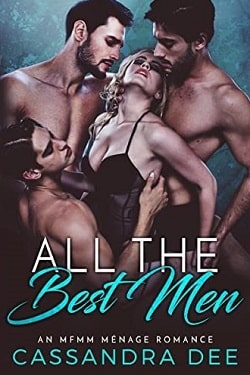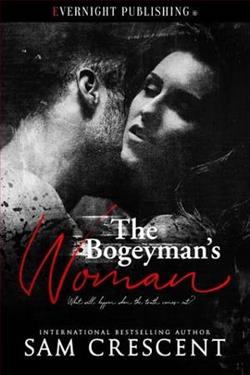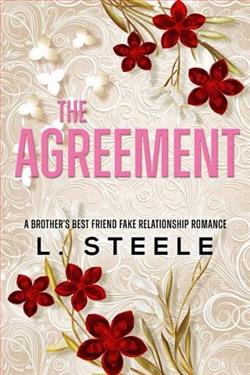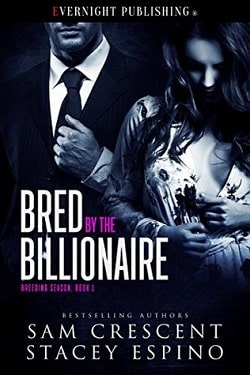Page 6 of Nocturne
I cap my lipstick and take a deep breath. Time to become Lena Reid again, the sultry singer with nothing—and everything—to hide. But underneath, with every beat of my heart, I feel the weight of my guilt.
I’m so sorry, Betty. I should have protected you.
I step back into the hallway, head high, ready to face the crowd once more. But as I move toward the stage, I feel it again—that prickling at the back of my neck. The sense of being watched.
When I glance back, the hallway is empty. But the feeling remains, a shadow following me into the spotlight.
The lock clicksbehind me as I enter my apartment, silence wrapping around me like a shroud. I lean against the door, letting the mask fall away. No more Lena Reid, the composed singer.
Just me, terrified and aggrieved.
My hands shake as I cross to the liquor cabinet, pouring two fingers of whiskey and downing it in one swallow. The burn does nothing to warm the chill spreading through me.
I move to the fireplace, mechanically arranging kindling and logs. The familiar ritual steadies my nerves as the flames catch, orange light dancing across the hardwood floors. For a moment, I just stare into the fire, mesmerized by its hungry motion.
Then I cross to the bookshelf, reaching above the collected works of Fitzgerald for the slim leather-bound book I placed there. Elizabeth’s diary.
I have to believe that she left it here for me to find. I have to believe that she would want me to read it.
Still, as I settle in front of the fire, running my fingers over the worn cover before opening it, I feel shame and guilt, about to read something that Betty probably meant for her eyes only. I open it carefully, her handwriting fills the pages—neat but hurried, as if she couldn’t get the information down fast enough.
I flip toward the most recent entries, wanting to read them first to see if they give any immediate clues, then I’ll go back to the beginning.
Dec. 14 – Package delivery to warehouse on Alameda. The Europeans watching again. Blonde woman in Cadillac followed three blocks.
Dec. 17 – Overheard conversation about “blood types” at the Satin Slipper. The tall one with the accent asking about medical records from blood drive.
Dec. 21 – Another package to the warehouse. Saw strange symbols painted on inner wall. They looked kind of like this:
I turn the page to find Elizabeth’s crude reproduction of symbols that make my blood run cold. They look ancient, like something out of the Bronze Age.
Dec. 28 – They’re watching my building now. Saw the blonde woman again. Think I’m being followed everywhere. Mickster says I’m imagining things. He never takes me seriously.
Dec. 30 – Saw something I shouldn’t have at the warehouse. A room with a table. Someone strapped down. A hit job? A sex thing? Getting out as soon as I can. This isn’t worth it. What if they somehow connect me to this stuff? What if I’m a patsy?
Jan. 8 – Leaving this diary at L’s apartment. If something happens to me, she’ll know why. Lena, in some ways I hope you’re reading these words. The Europeans are dangerous. The ones that work for Mickster. Maybe even Bugsy. I don’t know how deep this goes and I don’t want to know, but this is beyond the normal. I’m done. My final job (and I mean it!) is tomorrow night at the Biltmore, 8:30. For the first time they didn’t just promise me any screen tests or meetings. They promised enough money to disappear afterward. Don’t trust them but need the cash to get to SF.
The last entry. The job she never returned from.
My eyes skim the descriptions of the Europeans—a tall man, built like a boxer, with dark hair and cold blue eyes. The striking blonde woman with a heavy accent who moved with unusual grace, a Veronica Lake wannabe. The sly brunette with the diamonds. The heavyset man who never spoke. The thin man with the glasses. No names, just these tiny physical details and locations of where she saw them and what she dropped off for them.
I think of what the police would make of this. Of how they’d question how Elizabeth knew these people, what she was delivering. Drugs, I’m assuming. Maybe gambling money. Some hush hush photographs. But in the end, there would be questions that would inevitably lead back to me.
Questions that could eventually expose what I am.
What I’ve tried so hard to hide.
My parents told me when I moved to LA, that I mustn’t ever let the world know the truth about me, that I needed to stay in the shadows and stay out of trouble. But my natural magnetismmade staying in the shadows tricky—I was too memorable. And I wanted it that way. After all, you don’t have ambitions of becoming a singer, a star, only to dull your shine.
So I decided the best place for me would be out in the open. People would feel compelled by me, drawn to me, because of my onstage persona—and not for any other reason. No one would question why they had a mild obsession with Lena Reid, why Lena Reid always seemed to get what she wants.
But now? If people start poking into my life a little deeper? If they look at my parents? My upbringing? Then they’ll see things that won’t make any sense. And I made a promise to the others that I would never let us be exposed.
For a brief, panicked moment, I consider destroying the diary. I get to my feet and cross to the fireplace, kneading the worn book between my hands. Feeding it to the flames would erase this dangerous evidence. I wouldn’t have to hide it. But I can’t bring myself to do it. This diary is all that’s left of Betty—her voice, her fears, her final days.
I sigh and step back from the fire just as a slight movement outside the window catches my attention. I move to the curtains and carefully peer through a small gap. The street below is mostly empty, shrouded in the bleak mist of a January night.
Then I see it.















